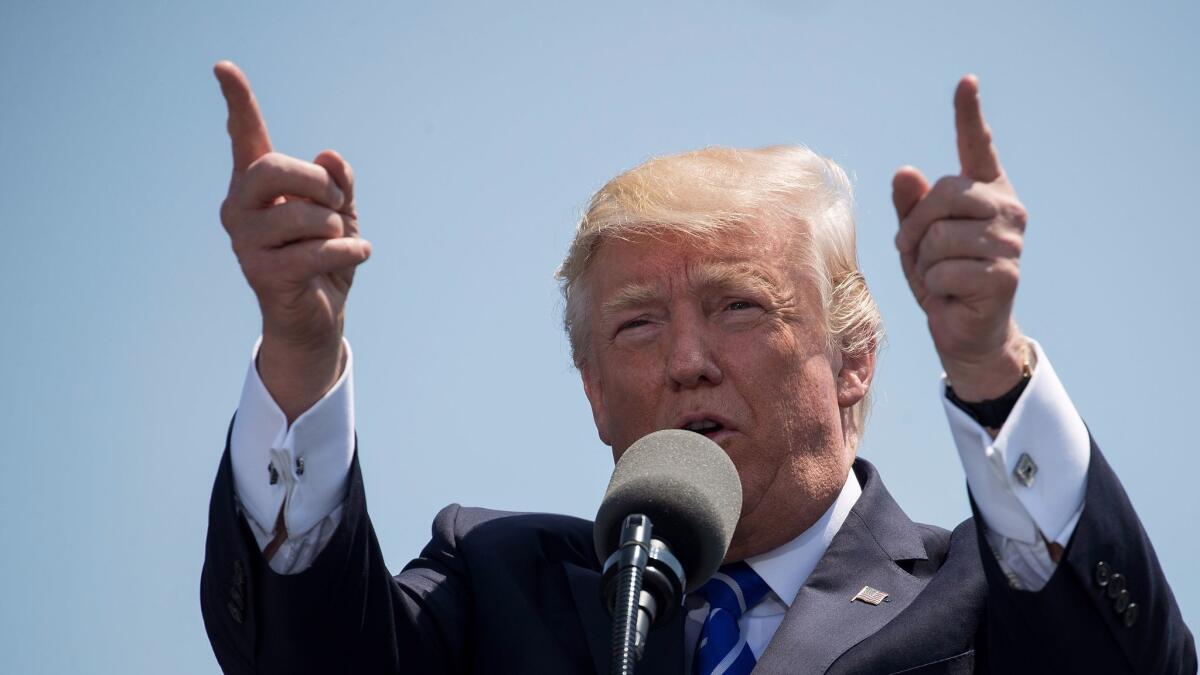How Trump might fend off an obstruction of justice claim

Reporting from Washington â It looks to many like a textbook case of obstruction of justice.
President Trump fired James Comey several weeks after the FBI director says the president asked him â during a private White House meeting â to shut down the investigation of Michael Flynn, the ousted national security advisor who was suspected of having secret dealings with the Russians.
âI hope you can let this go,â Trump allegedly said, according to a memo written by Comey that was described to multiple media outlets.
Assuming Comeyâs memos are accurate, âthe basis for an obstruction of justice charge suddenly got a lot stronger,â said Jennifer Daskal, an American University law professor.
âWe now have an allegation that the president cleared the room of both the vice president and attorney general before expressing his not-so-subtle âhopeâ that the Flynn investigation be dropped, followed by the firing of Comey when the âhopeâ was not met,â Daskal said.
The White House has denied Comeyâs characterization of the meeting. And some prominent lawyers urge caution in jumping to conclusions, noting that obstruction of justice is not easy to prove.
Under the law, it is a crime to âcorruptlyâ seek to âobstruct or impedeâ what it refers to as the âdue and proper administration of the law.â
Much depends on an assessment of the presidentâs motive, legal experts say. Itâs also noteworthy that in this case that the dispute probably will not play out in a courtroom, but in a public arena and in Congress, which has the final power to prosecute the president.
Former prosecutors and legal academics say they foresee at least three lines of defense for the president.
First, they can argue he was simply trying to protect a loyal advisor who he believed was wrongly put under a legal cloud, and was therefore not acting on a corrupt motive.
âHe could say he felt bad for Flynn. He didnât have a corrupt intent and was not trying to curtail a criminal case. He was just saying [to Comey,] âIt would be great if you gave him a break,ââ said Peter Zeidenberg, a Washington attorney and former federal prosecutor.
It will be important to focus on exactly what was said, added David B. Rivkin, a Washington lawyer who served as a White House lawyer under President George H.W. Bush. âThe question is, did this amount to a specific directive? If Mr. Trump had issued a clear-cut order to stop the investigation, Comey would have resigned. That did not happen. Therefore, what he said was much more attenuated.â
Second, the presidentâs lawyers could argue there was no crime here. The FBIâs investigation was at a preliminary stage and had not yielded indictments. Some lawyers say obstruction of justice charges are limited to interference in an actual criminal case, not an early stage of an FBI probe.
Elizabeth Price Foley, a law professor at Florida International University, said obstruction of justice law refers to a âpending proceeding,â and courts have interpreted that to refer only to prosecutions and agency hearings. This would not include an FBI investigation that has yet to lead to criminal charges, she said.
âWhile there may be understandable angst surrounding the purported Trump-Comey exchange, there does not appear to be a fair legal argument that the exchange constituted an obstruction of justice,â she said.
And third, the presidentâs lawyers could argue the Constitution gives the president very broad powers over investigations and prosecutions. Conservatives in recent decades have invoked the theory of the âunitary executive,â which puts the ultimate power in the presidentâs hands.
Rivkin, who played a lead role in formulating a constitutional challenge to President Obamaâs healthcare law, said the president is the chief law enforcement officer.
âWe have a unitary executive. Under the Constitution, he is the chief executive, and there is a perfectly reasonable argument that says he was capable of directing all the activities of executive branch officials,â he said. If so, the president may lawfully intervene in federal investigations under certain circumstances.
Suppose, he said, a president calls the attorney general to the White House and tells him he wants him to shut down all pending federal investigations involving low-level drug crimes. This would not be viewed as an illegitimate interference by the president in a pending law enforcement matter, he said, but an example of the president acting within his constitutional authority.
Rivkin acknowledged, however, that President Trumpâs alleged interference in the Flynn probe could raise other concerns, since the investigation could turn up evidence that implicates him or his campaign aides.
He and others agreed the public and political debate will turn on the presidentâs motives.
Zeidenberg, the former federal prosecutor, said Trump has helped build a case against himself.
âMost presidents in this kind of situation say: âWe want to get to the bottom of this.â They feign transparency because it looks good. He did the opposite. He put out statements and tweets saying this was a hoax and should be shut down,â he said. That furthers the impression the president has something to hide, he said.
Prosecutors in a normal case would also focus on the detail from Comeyâs memo that he asked the attorney general and vice president to leave the room.
âThat seems highly suspicious. If it were an innocent request, why do you want the witnesses to leave the room?â he said.
All these facts go to the motive, and thatâs crucial, he said. âI could take my computer and throw it in the Potomac River, and that could be legal. Itâs mine. But if the FBI had subpoenaed my computer, then itâs probably an obstruction of justice.â
On Twitter: DavidGSavage
More to Read
Get the L.A. Times Politics newsletter
Deeply reported insights into legislation, politics and policy from Sacramento, Washington and beyond. In your inbox three times per week.
You may occasionally receive promotional content from the Los Angeles Times.











